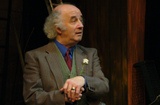Home
Globe Theatre, 104 London St, Dunedin
17/05/2007 - 28/05/2007
Production Details
By David Storey
Director: Louise Petherbridge
The setting is a sunny day in a lovely park. Two elderly gentlemen chat for a while before being joined by two equally chatty and elderly ladies. All is bright and cheerful, the chat, like that heard in any bar or bowling club, ranging over all manner of different topics. But all is not as it seems.
Cast
Jock - John Watson
Harry - Harry Love
Marjorie - Mary Greet
Kathleen - Kay Thompson
Alfred - Andrew Cook
Crew
Stage Manager - Rowena Thevarakam
Set - Andrew Cook
Technical - Jeffrey Vaughan
Wardrobe - Leigh Paterson
Poster Design - Andrew Cook
Front of House - Geoff Lambourne, Alison Finigan, Rosemary Beresford
Theatre ,
Mad hilarity and wistful poignancy
Review by Terry MacTavish 22nd May 2007
My step-grandfather was a British Major of the Boer War who in his later years, though officially in a psychiatric hospital, gloried in the delusion that he was overnighting on a lion-hunting safari. The mind’s strategies for enduring the petty miseries of incarceration are endlessly fascinating and this fine production of Home explores them sensitively, with gentle humour masking the tragedy.
The play consists of the passage of a single day in the garden of a Home, where five residents while away the time till whatever meal is next. Jean-Paul Sartre postulates a hell where the punishment is being trapped with the same set of people for ever, but the endearing aspect of these assorted oddities is the comfort they provide for each other.
The first we meet are two dapper and genteel elderly gentlemen, Jack (John Watson) and Harry (Harry Love), who keep up a polite flow of banality, truisms and bromides. "It gets worse before it gets better…not to complain…best to put on a bold front". This inanity, interspersed with well-worn jokes and dubious memories of The War, is so well-paced as to be very funny, and increasingly engrossing as it becomes clear that some mysterious unspeakable reality lies beneath the cliche.
Watson and Love are a treat to watch, completely convincing as they strive to appear normal while all the time making us aware of a frightening undercurrent. Watson as Jack most exemplifies the rich life of the imagination, but he is ably seconded by Harry, who courteously accepts Jack’s improbable stories about an endless string of relations. "I had an aunt/cousin/friend -more of an acquaintance really- who fell off a cliff/ jumped off a train/ was introduced at Waterloo – the station". The characters are so well realised by these fine veteran actors that gradually we come to empathise with them. There is true poignancy in the earnest dignity with which Jack draws himself up and puffs out his chest, hoping to be noticed by a lady in the distance.
Unfortunately the only ‘ladies’ who do swim into their ken turn out to be very unladylike indeed. Marjorie (Mary Greet) and Kathleen (Kay Thompson) are jolly and vulgar, intent on grabbing the garden chairs by fair means or foul. Their crude raucous conversation punctures the delicate balloon of reticence and mutual respect with which the men have surrounded themselves. Unlike the men they do not shrink from reality and their insensitive enthusiasm for calling a spade a spade allows us to learn some unwelcome truths about all four characters.
Again the acting is a delight and Greet and Thompson, cackling happily, make an unforgettable couple. If you ever wondered where Pinter’s two bag ladies from The Black and the White ended up, this could be your answer. While they cheerfully abuse each other, ("She can’t keep away from men…painted rude words on the road…get your skirt down, girl!") their friendship, like that between the men, clearly sustains them.
Rounding out this tight-knit cast is the inimitable Andrew Cook, who also created the lovely moody set, playing a touchingly sad ex-wrestler who has had part of his brain removed: – "Feel better?" asks one of the women. These occasional odd-ball efforts to cheer up the more sensitive men (like confiding the tale of a suicide attempt interrupted by the milkman) culminate in a moment of true tenderness when Kathleen asks Harry, "Shall I hold your hand?" Such harmony cannot last long however, and their fragile social construction disintegrates with the sunset.
The set seems a natural continuation of the lovely melancholy garden of the Globe Theatre, carpeted with autumn leaves smelling sweetly of decay. There is sense of benign neglect: rickety ladder, overturned chair buried in foliage; but the corner of the huge red-brick Home looms over all, while the lighting traces the rhythm of the long day.
Director Louise Petherbridge wrings every moment of mad hilarity from the text without losing any of its wistful poignancy. One moment we laugh like drains at the story of the husband eating his wife’s ear while she slept, the next our withers are wrung by the sight of Alfred, scolded for weight-lifting the garden furniture, sobbing childishly with his face pressed to the wall of the menacing Home. The meticulous direction never allows the pace to flag or the compassion to descend into sentimentality.
Some patrons might find boring a play in which nothing much happens except for the desperate heroism of making it through another day. I loved it. Although Home was first staged in London in 1970, with Sir John Gielgud and Sir Ralph Richardson playing the two dapper gents, as our baby boomers age, it is still frighteningly relevant. "A bit too close to the bone," I heard one elderly patron mutter as she left.
Copyright © in the review belongs to the reviewer







Comments